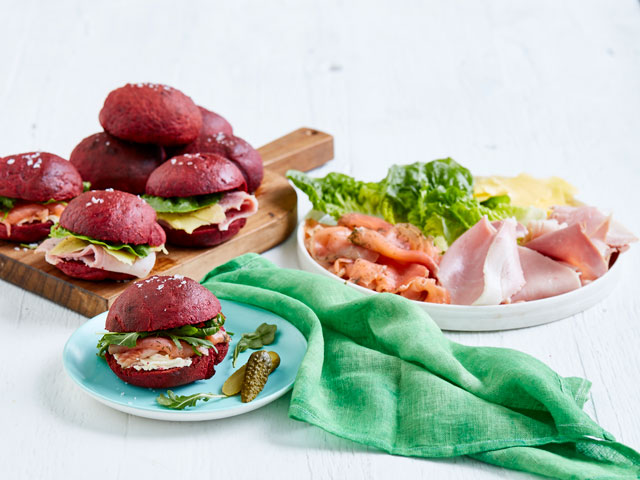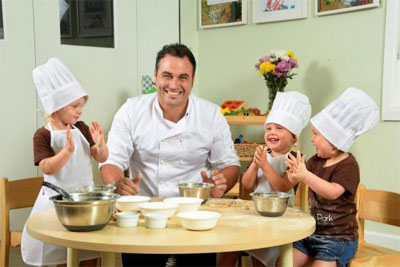Miguel's Beetroot Bread

Miguel's Beetroot Bread
Ingredients
4 medium beetroots, peeled, chopped
½ cup milk
25 mls warm water
2½ tsp dry active yeast
1 tbsp sugar
1 kg plain flour
2 tsp salt
2 tbsp olive oil
Method
Combine the water, yeast and sugar in a small bowl and set aside for 5 minutes to activate.
To make the beetroot puree, place the beetroot in a food processor and process with the milk until smooth. This should make 1 ¼ cups puree.
Place the flour, salt, yeast mixture, beetroot puree and olive oil in a large bowl and combine.
Tip the mixture onto a clean, flat, lightly floured surface and knead for about 10 minutes or until smooth and elastic. (NOTE: Use plastic wrap to protect surfaces from beetroot colouring). Place in a large lightly greased bowl, cover and set aside to rise for an hour (the mixture should double in size).
Line a baking tray with baking paper. Remove risen dough from bowl; roll small balls from the mixture and place onto the prepared tray, leaving space between each ball. Lightly cover with greased cling film and leave to rise for 45 minutes.
Preheat the oven to 190°C. Bake the bread rolls for 15-20 minutes or until cooked and golden.
Remove from oven and let bread rolls cool down.
Leading chef Miguel Maestre has developed this recipe for Paisley Park Early Learning Centres nationally, and has come on board in a food advisory role to help instil healthy eating habits in children from a young age.
 Paisley Park co-founder, Kat Wiezorek-Ghisso's top 10 tips for encouraging positive relationships with food at home:
Paisley Park co-founder, Kat Wiezorek-Ghisso's top 10 tips for encouraging positive relationships with food at home:
Sit-down family meals are extremely important – try to all eat together at least five nights a week
Have your children help you prepare the family meal, including setting up the table and cleaning up together
Preparing and sharing a meal together allows children to experience a sense of personal achievement when they have produced a meal that is enjoyed by the whole family. Cooking extends to all learning areas such as measuring, estimating, problem solving, dexterity and coordination, language development through reading recipes and learning methods.
Planning is vital to avoiding the last-minute purchase of take-away dinners
Simply having a weekly calendar in place where family meals are planned will make it easier to commit to quality family time and healthier meal choices.
Expose your children to a variety of fresh ingredients from an early age
We now know this supports a child's development of a diverse, healthy palates contributing to them making better long-term meal choices.
Involving children in ingredients sourcing, growing their own in veggie patches and actively assisting with shopping, means they will be more receptive to taking responsibility for their own well-being
Plants can be grown in virtually anything. Simply take a trip to your local nursery or even supermarket to buy some seeds and watch them grow!
Allow your child to use real food implements, such as knives, forks, crockery and glassware
This experience promotes the meal experience as being 'real' and one where the child has contributed to the decision making. It's important to remember to role model appropriate use and excuse the odd accident.
Encourage your child to use tongs and serving spoons to serve themselves, rather than presenting them with a bowl of food
When given this responsibility, children are more inclined to eat what they serve.
Don't use food as a reward or punishment, such as, "if you eat your veggies, you will get ice cream for desert"
Using this threat is encouraging children to develop a poor relationship with food and negative associations with ingredients featured in meals. Children need to be encouraged and appropriately praised for being part of the whole meal time experience, which ultimately leads to its success.
Include physical activity into your family's day
Going to the park, walking the dog, throwing a ball or going for a scooter ride will role model a naturally active lifestyle for young children.
Find out when your local fresh produce markets are on and become familiar with local growers
Not only will this be a fun social occasion for your family, this will help build your child's knowledge of where food really comes from.
MORE



